How to start climbing
By Stuart McAleese IFMGA Mountain Guide
Climbing presents both mental and physical challenges, and the opportunity to learn new skills and techniques at both indoor climbing walls and spectacular outside rock-climbing venues throughout the UK. I was lucky enough to learn about climbing at a young age while in school and with the Scouts, but I still learn from my climbing friends and look to role models for inspiration. Climbing offers fun and adventure at every ability level and age – it’s never too late to start! From the moment you begin learning, there are opportunities for adventure and memorable experiences, and to develop a skillset that you can continue to grow for years to come. Read on for some top tips and advice on how to start climbing.
Climbing Walls:
The number of people using climbing walls has grown significantly in recent years, many of them beginners who find it an ideal environment for learning how to climb. There will often be family groups trying climbing for the first time and clubs connected to the climbing wall who meet up regularly. Climbing walls now generate quite a community around them, and many have cafes and shops attached too, making them a great place to meet, train and climb.
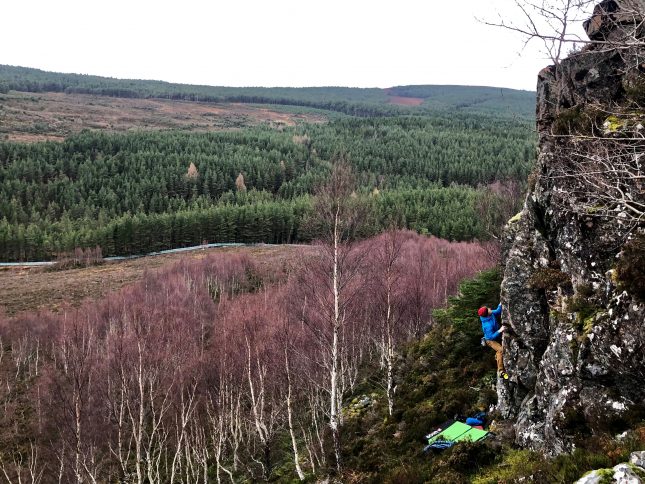
Climbing and Mountaineering Clubs:
In addition to your local climbing wall, it can be worth looking online to find nearby climbing and mountaineering clubs when starting climbing. Getting in touch with a club can be a great way to get started or to build your experience, with many arranging new members’ meets which are ideal opportunities to find others with the same goals. Clubs tend to be well organised by passionate, experienced climbers and mountaineers and can be superb way to gain insight, meet new friends and build your climbing experience. You can learn from other experienced club members, and they’ll often plan trips and ‘club meets’ climbing and mountaineering in different locations throughout the UK and the Alps. The British Mountaineering Council (England and Wales), Mountaineering Scotland and Mountaineering Ireland will tell you everything you need to know and where to look to find out more.
Professional Rock Climbing Instructor/Mountain Guide – RCI, MCI, AMI, or BMG:
Depending on your level of confidence starting out, it can sometimes be worth looking into attending a climbing course, either at the climbing wall or outside rock climbing with a professional Instructor/Mountain Guide. This can be a great way to learn the basics or to build on existing skills while experiencing some of the classics routes the UK has to offer. You’ll also receive some good advice for your future climbing ambitions and may find that a lesson can lead to successive days with your Instructor/Mountain Guide, building on your experience and creating a learning pathway towards independent rock climbing.
Outside rock climbing – what to expect:
Compared with the climbing wall, there is far more adventure to be had in the outdoors where different locations and varied rock types offer more interesting and challenging climbs. There are many options for climbing venues and all present their own character and challenges, ranging from sea cliffs to mountain crags and moorland outcrops. Different locations and rock types require the appropriate tactics and climbing technique, which means there’s always more to learn and new experiences to be had.
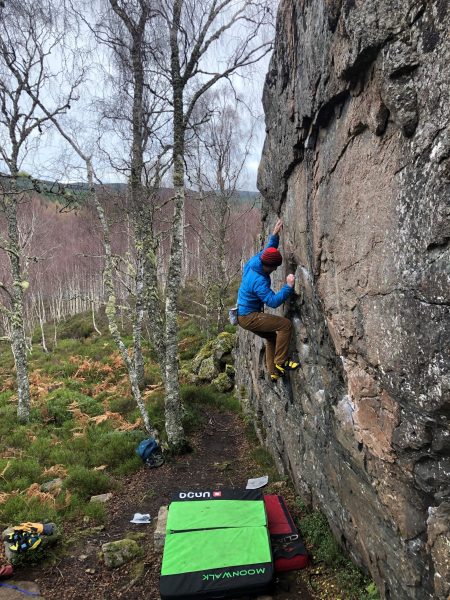
Start small and build up slowly – different forms of rock climbing:
Here lies a natural progression which is useful for beginners, and thanks to the varied weather and types of climbing available in the UK, offers variety for more experienced rock climbers.
Bouldering: Time efficient climbing with very little equipment, often on boulders or short walls focusing on technique and the challenge of a small route. It’s become standard to have a bouldering matt for landing protection and it offers great training for developing strength and technique.
Trad Climbing: Most of the rock climbing in the UK is traditional (‘trad’) meaning you must construct your own belays and gear when climbing; a superb skill set which takes time to learn and master. It also requires a minimum amount of climbing rack, something which can be built up over time or shared between friends.
Sport Climbing: Rock climbing with bolts in the rock already or placed permanently as protection and belays.
Single Pitch Climbing: Trad or Sport on a cliff that can generally be easily accessible and of a certain height – and single rope length.
Multi Pitch Climbing: Trad or sport on a big cliff where more than one rope length/pitch is required to get to the top of the climbing. Often access will be more challenging than single pitch and may have an involved descent/scramble or an abseil.
Equipment, reference books and rock climbing guidebooks:
Lots of the initial basic equipment required can be borrowed from either climbing walls, Instructors/Mountain Guides or experienced friends and family. But in time you will want to acquire your own equipment. Personal equipment like rock boots, helmet and harness can be purchased relatively easily through climbing shops and online. Owning your own personal kit that you’ve tried and tested for comfort will help you operate better and make you feel good about your climbing. Look out for rock climbing reference books, which allow you to process the technical aspects of climbing at your own pace. There are many great rock-climbing guidebooks that detail rock climbing around the UK; not only are guidebooks inspiring, but they also contain lots of great information such as rock-climbing history of that specific area, geology, logistics, access, and the environment.
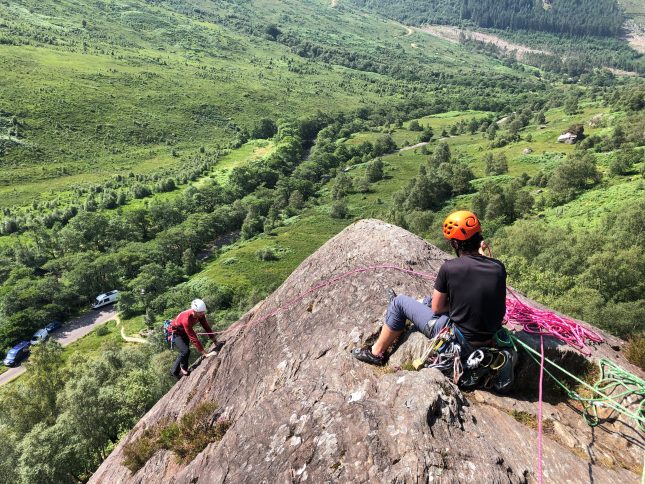
Once you’ve got started:
Climbing can take you to some of the most adventurous, amazing, and wild places in the world. It’s a respected skill set that takes a while to learn, but without practice you can get rusty, so make sure to revisit aspects you feel less confident about especially if it’s been a while since you climbed.
At first, measure your performance on how your experiences have felt and reflect on this with your climbing team. I find climbing a route I’ve done before but aiming to do it well can be a great warm up or a way of starting the season off again. Be tactical in choosing your adventures and when to progress. Alongside climbing grades, different rock types and venues offer their own challenges and levels of difficulty. These differences demand respect: before testing your limits with the next challenge, ensure you’re in the zone and that you and your climbing partner understand the grading systems, the limits of your equipment, know how to use it effectively, and are happy with your climbing technique.
Mindset:
Keep your eyes and ears open and choose role models to help with your learning and motivation. There are many ways climbing can give you focus whether your goal is trying a new rock type or route grade or preparing for your next adventure at a new location. At the crag or climbing wall, watch and learn from others, including your peers and friends. Respect other climbers around you and the environment you are in; we’re fortunate to climb in many of these special places, and they need to be cared for and left untouched. The climbing community is friendly and happy to support those new to the sport in their learning, so if you see others at crags or in the mountains, give them a wave and say hello!
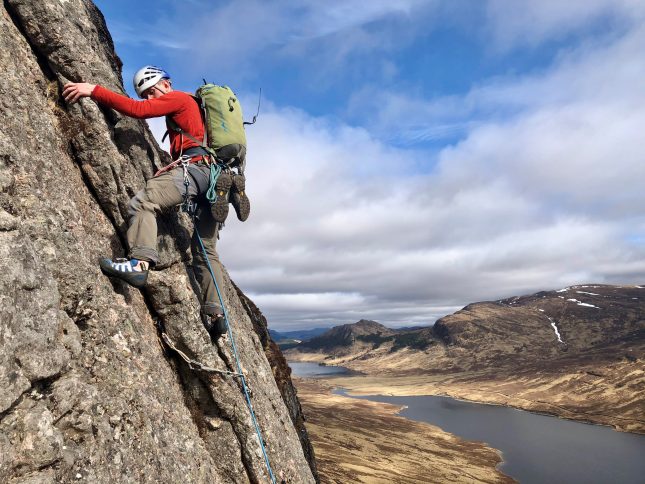
About Stuart
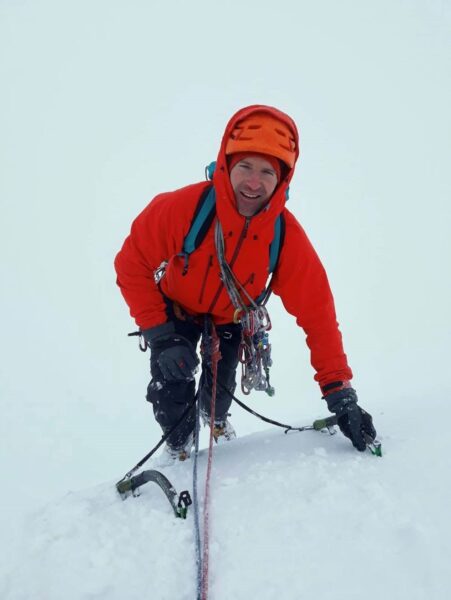
Originally from Northern Cumbria I started out hill walking in the Lake District when I was at school. I soon become interested in rock climbing and mountaineering, and was lucky enough to work and climb with Mountain Guides during my first job leaving school. Since then I’ve been working full time in the mountains for around 20 years.
At the same time as working, I enjoy climbing in my free time and have been lucky enough to go on many expeditions around the world, climbing new mountains, first ascents and tough remote summits. Places such as Patagonia, Alaska, Himalaya, Peru, Baffin Island, Yosemite and China. In 2004 I was nominated for the prestigious Piolet d’Or in Grenoble, France, for a 1st ascent of the ‘Supa Dupa Couloir’ in Alaska.
I love my job as a Mountain Guide, teaching and exploring big mountains in all weather all year round. I joined the Glenmore Lodge team in 2019 and head up the Summer Alpine programme.